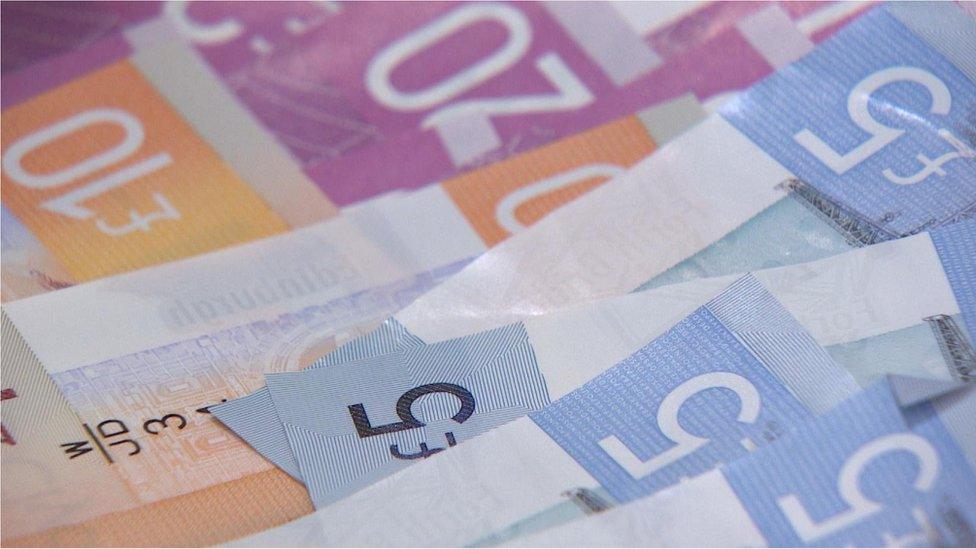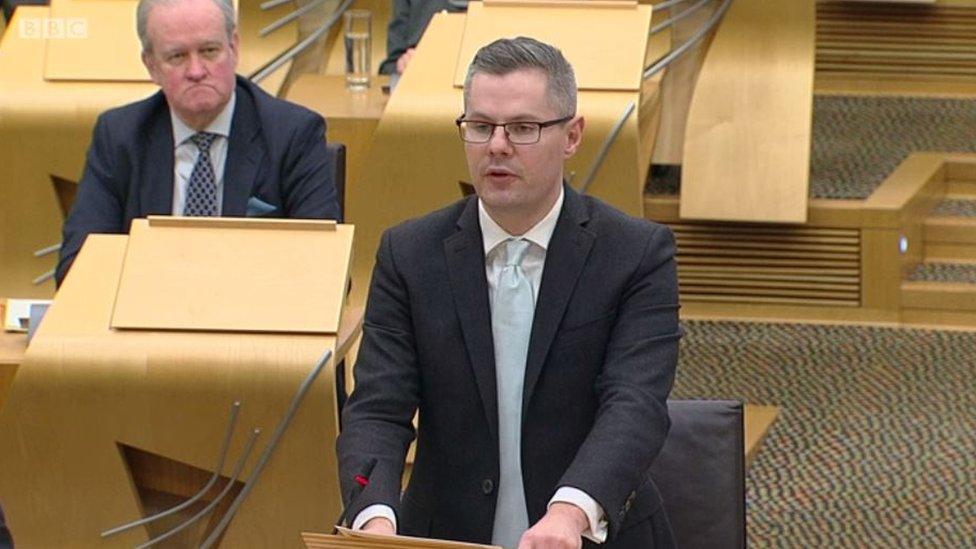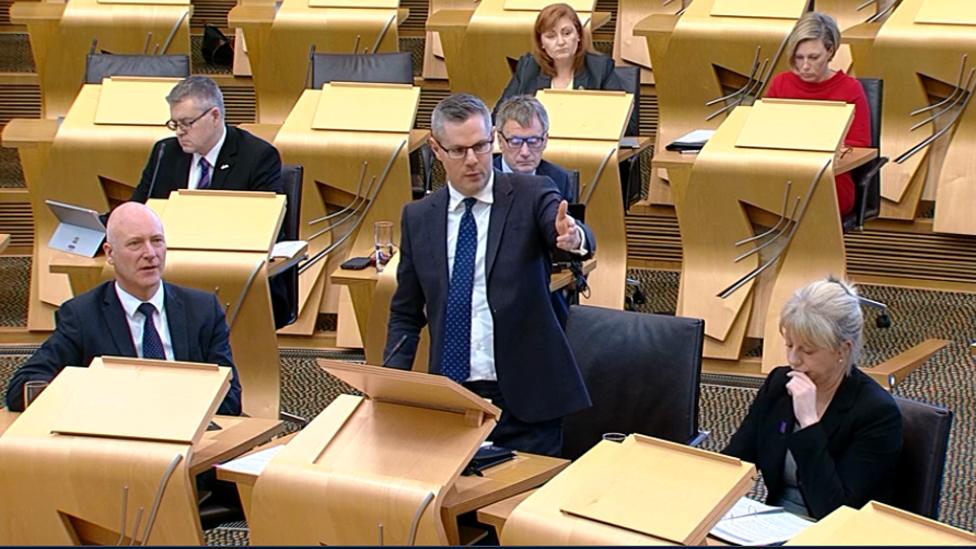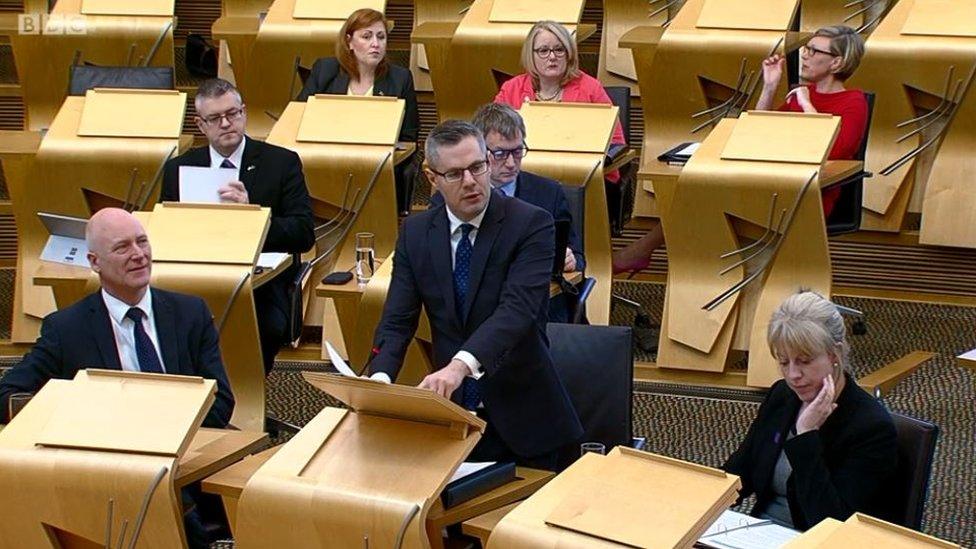New Scottish income tax system comes into force
- Published
- comments

Scotland's new system of income tax rates and bands has come into force.
The changes, which were signed off by MSPs alongside the Scottish government budget in February, will see many pay less tax, but some pay more.
Finance Secretary Derek Mackay said the new system is more progressive and will raise extra funding for local services.
However the Conservatives say the move will hit growth, while Labour claim the changes do not go far enough to make a real difference.
Until today, Holyrood had matched the structure of the tax system in the rest of the UK, with three bands - a basic rate at 20%, a higher rate at 40% and a 45% top rate.
The new Scottish system adds a 19% "starter" rate for those on low incomes, as well as a 21% rate for those who earn above the median salary. It also adds a penny to the higher and top rates, bringing them to 41% and 46%.
This is projected to raise an extra £219m for spending without the need for cuts elsewhere, with the government committing extra funds to the NHS and education.
As a result of these changes - and the uplift in the tax-free allowance across the UK - some 70% of Scots taxpayers will pay less than they did in the previous financial year.
Changes to the thresholds at which the bands kick in means there are widening differences between what people on the same wage pay in tax in Scotland compared with the rest of the UK - although 55% of Scots will ultimately pay less than they would if they were living south of the border.
Mr Mackay said the new rates and bands would "make the system more progressive and deliver additional revenues to invest in public services".
He said: "This progressive approach to reforming income tax will not only protect the lowest earning taxpayers, but ensure 70% of Scottish taxpayers pay less tax this year than last year for a given income, while the majority of Scottish taxpayers will pay less than if they lived elsewhere in the UK.
"These measures, combined with our investment in the NHS, the economy, infrastructure, education and essential public services, ensure Scotland will be the fairest taxed part of the UK and provide the best deal for taxpayers."
'Unimaginative and unnecessary'
The budget ultimately won the support of the Greens and two of Holyrood's five Lib Dem MSPs, but the Conservatives and Labour both voted against the overall package - for very different reasons.
Tory finance spokesman Murdo Fraser said the changes were a "punishing move which businesses and experts right across the country warned against".
He said: "Scotland's economy is already suffering at the hands of SNP stewardship, growing at less than half the rate of the UK average.
"The SNP's unimaginative and unnecessary tax grab will only make that worse. Instead, we should be striving to create a high wage, low tax, low welfare economy."

Derek Mackay said the changes were "progressive"
Labour set out its own, more radical tax proposals shortly before the first budget vote, and MSP James Kelly said the government's reforms were "nothing but a missed opportunity".
He said: "Derek Mackay has done nothing but tinker around the edges, passing Tory austerity on to the people of Scotland.
"Rather than asking the richest to pay their fair share, the SNP has cut council budgets and failed to deliver a proper pay rise for public sector workers. Scottish Labour would use the tax powers to make the richest pay their fair share, end austerity and deliver real change."
'Radical opportunity'
The Greens agreed a deal with Mr Mackay to back his budget along with the tax proposals, and persuaded him to reduce the threshold for the 41p band.
Co-convener Patrick Harvie said it was his party's approach which had "shifted the debate" on taxation in Scotland, declaring himself "delighted" that Scotland had a "radical opportunity to build a fairer tax system" with "progressive values".
The Lib Dems also called the budget a "missed opportunity", with leader Willie Rennie saying it "fails to invest the necessary funds to transform education and make a step change in mental health services".
However the Lib Dem MSPs for Orkney and Shetland - Liam McArthur and Tavish Scott - ultimately voted for it in order to back funding for northern isles ferry services.
- Published21 February 2018

- Published20 February 2018
